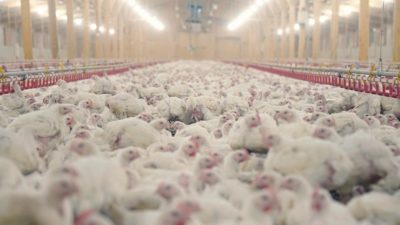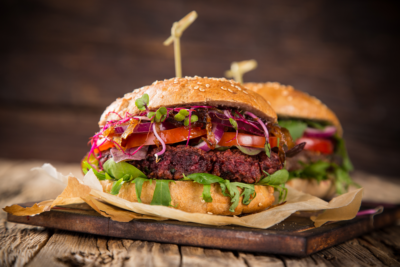As the UK’s Channel 4 airs its latest Dispatches programme, Veganuary responds.

January has finally arrived! Over 180,000 people around the world have already signed up to Veganuary’s 31-day plant-based pledge so far this year, and are in the midst of their journey of discovery into the incredible world of all things vegan!
With more exciting plant-based foods available every day, and inspiration from famous faces including Lewis Hamilton, Ariana Grande and Leonardo DiCaprio, it’s easy to see why so many people are choosing to explore veganism in 2019.
People who take part in Veganuary tell us they do it for three main reasons – to improve their health, to protect the environment, or to reduce animal suffering.
The last has always been the biggest reason people try vegan: with growing awareness of the way in which animals are raised and slaughtered in law-abiding farms and slaughterhouses, many people are choosing to move away from practices and traditions they see as increasingly outdated and unnecessary.
The Veganuary effect sees interest in veganism spike in January each year, and this year brought with that a documentary on Channel 4, one of the UK’s biggest public service TV broadcasters.
Titled The Truth About Vegans, it discussed the reasons people are trying vegan, and focused on pro-vegan direct action, particularly that involving undercover investigation into farmed animal welfare.
This is Veganuary’s take on the issues raised.
Farming Practices – is what you see what you get?
The reported high quality of life of farmed animals is often used to defend the consumption of meat and animal products.
You may well have heard the terms “humane meat” or “humane slaughter” referred to when it comes to animal agriculture. However, many vegans believe there is no humane way to kill an animal that doesn’t want to die. The lives of farmed animals are cut drastically short – pigs, for example, will often be slaughtered at 6-9 months old, when their natural lifespan can exceed 10 years.
And some entirely lawful practices may still be considered inhumane by many vegans.
Mother pigs, for example, are routinely locked in “farrowing crates” – unable to move or to tend to their piglets who have been purposefully removed from their enclosures. Male chicks are an unnecessary byproduct of the egg industry and are routinely killed shortly after birth.
Working With Animal Farmers, Not Against Them
One of the most important ways by which vegan proponents can help the farming community, and indeed the health of the planet, is by encouraging farmers to grow plant-based protein sources rather than rearing animals – as called for by The Vegan Society’s aptly named Grow Green initiative.
As consumer interest in plant-based foods increases, many farmers are choosing to diversify, where their land allows.

Beef farmer Jay Wilde gave his cattle to an animal sanctuary and became an organic arable farmer, telling the BBC:
“It was very difficult to do your best to look after [the animals] and then send them to the slaughterhouse for what must be a terrifying death”.
He continued to comment how a “lack of imagination” had previously prevented him making a switch towards a more sustainable, greener choice of farming practice. Jay is not alone here – a recent Telegraph article discussing how farmer’s son and presenter of the Channel 4 documentary, Morland Sanders, decided to ditch meat this January.
Faced with a changing wind amongst consumers, some farmers are beginning to reconsider their involvement in animal agriculture.
Compassionate Activism
The treatment of animals in animal agriculture can be an emotive topic. What to a dairy farmer is lawful and appropriate animal husbandry may appear to a concerned individual as immoral animal abuse.
That something is lawful, the vegan may argue, doesn’t make it right. At Veganuary we hear these arguments a lot.
Some vegans feel a powerful sense of morality to speak out against farming practices they see as abusive. Some vegans want to do everything they can to help raise awareness and to protect animals from harm, and feel a sense of responsibility to do so – to animals, to themselves, or to future generations.
At Veganuary, we think it’s important that this passion is channelled in a way that will most effectively win hearts and minds – through respectful dialogue and meaningful support.
Animal charity Viva! is criticised in the Channel 4 documentary for the impact its actions have had on individuals involved in the animal agriculture industry.
Viva! undertakes important work in helping raise awareness of the conditions farmed animals are raised and slaughtered in, so we can make informed decisions about whether or not we want to support this through our dietary choices.
At Veganuary, we unashamedly want to help everyone to go vegan. But not everyone is ready for that discussion. And so we inspire and support those that want our support.
We try not to preach, and we recognise that everyone makes changes at their own pace. We aim to empower, by providing practical advice to help make it easy to try vegan and – after a month – make a really informed decision about their future dietary choices.
“Veganuary inspires and supports those who are interested in exploring a vegan lifestyle. We don’t seek to make people feel bad about their current or previous lifestyles – we all ate meat and dairy products once. We’ve been there. With Veganuary’s support, everyone can make a positive difference to the world, three times a day, by choosing to eat vegan. And we think that’s pretty great.”
Simon Winch, Veganuary CEO
Inspired to try vegan? Sign up for Veganuary’s free 31-day vegan pledge











